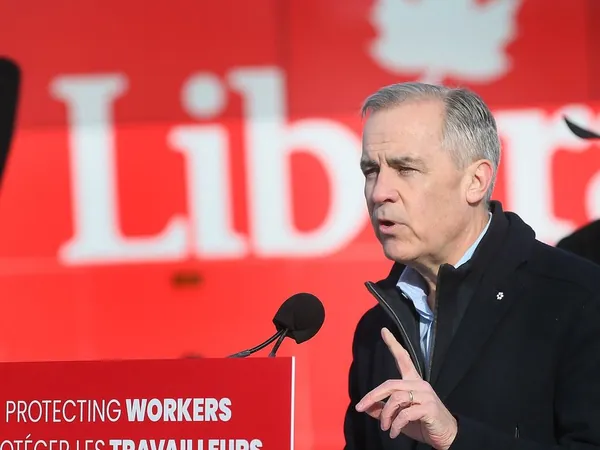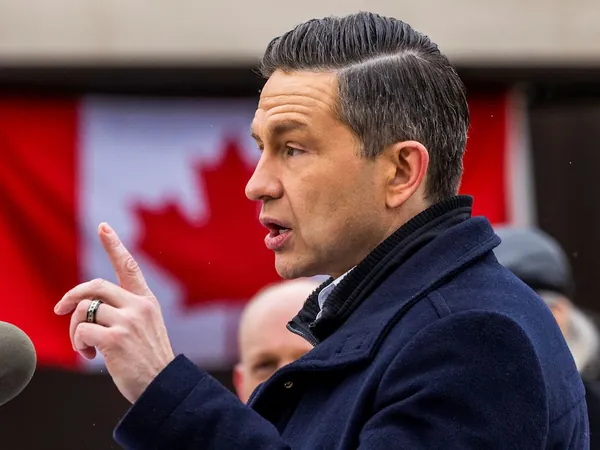
Mark Carney Defends Offshore Tax Structures, Claims Benefits for Canadian Pensioners
2025-03-26
Author: Noah
Mark Carney's Green Investment Funds
In a recent press conference, Liberal Leader Mark Carney found himself in the spotlight as he defended the establishment of two green investment funds linked to Brookfield Asset Management in Bermuda, a recognized tax haven.
Investing in green energy and infrastructure, these funds boast a combined worth of $25 billion and were created to optimize returns for Canadian pensioners. "The important thing is that the funds ultimately benefit Canadian entities that pay the appropriate taxes instead of being taxed multiple times before reaching their destination," Carney explained while addressing reporters in Windsor, Ontario.
Controversy Over Tax Haven
The controversy arose following a report from Radio-Canada revealing that these funds were registered in Bermuda, known for its lack of corporate taxes. Carney emphasized that the funds serve the interests of millions of Canadians whose pensions are invested in these ventures. "The structure of these funds is designed to benefit the Canadian pension funds that invest in them," he added.
Demand for Sustainable Investments
The funds were established in response to the increasing demand for sustainable investment opportunities. Supporting projects in renewable energy and infrastructure is crucial as Canada seeks to transition to a greener economy. With significant backing from pension funds, these investments could result in both financial returns and a positive environmental impact—a critical dual aim in today’s economy.
Political Fallout
Opposition leader Pierre Poilievre from the Conservative Party seized the opportunity to criticize Carney, claiming that he concealed his assets in Bermuda to escape taxes imposed on Canadians. Poilievre promised that the Conservative platform would focus on cracking down on such tax havens, stating, "Mark Carney hid his corporate assets in Bermuda to dodge the taxes that Liberals force on Canadians."
Carney's Defense
In defense of his actions, Carney reiterated that individuals such as teachers and municipal employees are the ultimate beneficiaries of these investment structures, as they pay taxes on their pensions. He firmly believes that the resources generated by these funds will lead to long-term benefits for the Canadian workforce.
Transparency and Future Commitments
As Carney faces scrutiny regarding his previous role at Brookfield, where he served for over four years, he reassured the public that he currently holds no personal stakes in either Brookfield or the digital payments company Stripe, whose board he joined in 2021.
Amid questions about transparency and past alliances, he underscored his continued commitment to advocating for Canadian pensioners, framing his actions within a larger narrative of responsibility toward future generations.
Implications for Canadian Investment Landscape
As this situation develops, the implications for the Canadian investment landscape and the debate over tax practices will surely intensify. How could this affect the ongoing discussions around corporate tax contributions and the use of offshore structures? Only time will tell as Canadians watch closely.









 Brasil (PT)
Brasil (PT)
 Canada (EN)
Canada (EN)
 Chile (ES)
Chile (ES)
 Česko (CS)
Česko (CS)
 대한민국 (KO)
대한민국 (KO)
 España (ES)
España (ES)
 France (FR)
France (FR)
 Hong Kong (EN)
Hong Kong (EN)
 Italia (IT)
Italia (IT)
 日本 (JA)
日本 (JA)
 Magyarország (HU)
Magyarország (HU)
 Norge (NO)
Norge (NO)
 Polska (PL)
Polska (PL)
 Schweiz (DE)
Schweiz (DE)
 Singapore (EN)
Singapore (EN)
 Sverige (SV)
Sverige (SV)
 Suomi (FI)
Suomi (FI)
 Türkiye (TR)
Türkiye (TR)
 الإمارات العربية المتحدة (AR)
الإمارات العربية المتحدة (AR)